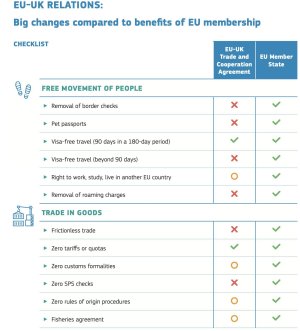Brexit: EU diplomats briefed on Brexit trade deal
EU ambassadors have received a Christmas Day briefing on the post-Brexit trade deal reached with the UK.
EU chief negotiator Michel Barnier updated them on the agreement, reached after months of fraught talks on fishing rights and business rules.
MPs will vote on the deal in Parliament on 30 December, with the UK set to exit existing trading rules on 31 December.
The 1,246-page document, which includes about 800 pages of annexes and footnotes, has been seen by the BBC.
A 34-page summary of the deal has been published on the UK government's website, but not the complete text.
Labour said it was a "thin agreement" but they would back it as the only alternative to no deal, meaning it should win approval.
The European Parliament needs to ratify the deal but it is unlikely to do so until the new year, meaning its application will formally be provisional until then.
Sebastian Fischer, a spokesman for the German presidency of the Council of the EU, joked ahead of the EU diplomats' meeting that he was looking forward to it "because nothing is more fun than to celebrate Christmas among socially distanced colleagues".
Meanwhile, French Europe minister Clement Beaune said it was a "good agreement", adding that the EU had not accepted a deal "at all costs".
In a Christmas video message, posted on Twitter on Thursday evening, Prime Minister Boris Johnson brandished a draft copy of the document.
He said: "Tonight, on Christmas Eve, I have a small present for anyone who may be looking for something to read in that sleepy post-Christmas lunch moment, and here it is, tidings, glad tidings of great joy because this is a deal.
"A deal to give certainty to business, travellers, and all investors in our country from January 1. A deal with our friends and partners in the EU."
European Commission President Ursula von der Leyen described the agreement as "fair" and "balanced", saying it was now "time to turn the page and look to the future". The UK "remains a trusted partner," she added.
Struck four and a half years after the UK voted to leave the EU, the deal will define the future relationship for decades.
Goods will continue to be traded free of tariffs and quotas and there will be independent arbitration to resolve future disputes.
It will mean big changes for business, with the UK and EU forming two separate markets, and the end of free movement.
https://www.bbc.com/news/uk-politics-55443780






 )
)
